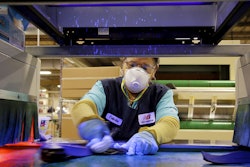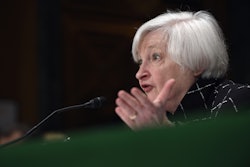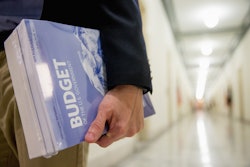MARIA-02
Prices Continue to Impact the Markets; Trump & Sanders Projected Winners in
New Hampshire Primary - Part 2>
Ling Kent >
Trump>
Markets; New Hampshire; Polls; Economy>
And all that is where the focus is. It's real. It's something to be concerned about. It's creating a lot of havoc on the -- on the currency side. I think that was a big driver of the markets yesterday in Japan.
But what we think ultimately the consumer, which the U.S. still dominates the economy, given the fact that real wages are growing. Unemployment is less than five percent. You've got -- you know, wealth has been created, you know, through a stronger housing market.
The consumer is in good shape, and we think the consumer will continue to spend. So far so good in the first quarter, and if that happens, we think the translation will be about two percent growth in the U.S. Not great, but also not horrible.
BARTIROMO: So --
BANKS: And that could give you about four percent earnings growth.
BARTIROMO: Now isn't it -- isn't it true, though, that like, for example, in Japan, corporates are actually seeing good profitability and good revenue growth when you're putting the macro story aside. Can these markets decouple? Can equities decouple from the currency story and from the oil story? Or no?
BANKS: I don't -- I think initially you doing need to see stability in oil. We think oil will stabilize in the -- somewhere in the mid to high 20s. Supply is coming out. It's coming out the form of CapEx is dramatically being reduced, and it will be reduced further.
You're seeing bankruptcies will be coming. Big fields are being shut in. None of that is showing up in production quite yet, but we think you'll start to see the in the late spring-summer timeframe.
You need stability in oil. You need stability in China. What's interesting, Maria, is if you look at the high-yield market, the high-yield market now is correlating to about 85 percent -- excuse me -- with respect to oil prices. Normally 23 percent. And for the equity markets, about a 50 percent correlation. Normally zero.
BARTIROMO: Wow.
BANKS: So you can't decouple on those.
DAGEN MCDOWELL, FOX BUSINESS NEWS: Can I -- Can I just bring this up --
BANKS: Yes.
MCDOWELL: -- because it's about oil and gas. But we've been talking about the oil and gas story and the heavily indebted companies for over a year now.
BANKS: Yes.
MCDOWELL: But yesterday, what happened with Chesapeake Energy and Williams and then Energy Transfer Equity LP? That was shocking to the market.
There was a report out that Chesapeake had hired a restructure -- basically, a bankruptcy --
BANKS: Right.
MCDOWELL: -- a restructuring firm. Stock fell. Lost half its value. It recovered. It was only down 28 percent. But then Williams, pipeline company, has deals with Chesapeake, fixed deals. Guess what? Chesapeake goes bankrupt, those deals are going to get reworked.
And this defies these stocks that people have been recommending all the way down.
BANKS: Right.
MCDOWELL: The energy transfer was down 42 percent yesterday. Williams still lost of more than a third of its value.
BARTIROMO: That doesn't surprise me, though. I mean, none of this surprises me, that oil prices plummeting. We knew that this is going to have knock on effects, specifically, job cuts and CapEx cuts.
MCDOWELL: But then it should have been factored in six months ago. People are still living in la la land when it comes to these companies.
BARTIROMO: I don't know why.
MCDOWELL: I know. That's my point.
BANKS: And I don't -- I don't either. Look, I think you're right.
BARTIROMO: Totally -- and this was totally obvious.
MCDOWELL: I --
BANKS: Yes.
MCDOWELL: -- totally agree.
BANKS: I'm surprised the market was surprised. And you can just see it, right? So now what you're going to start to see -- and it's going to accelerate -- are the bankruptcies on the --- in the energy sector and energy related sectors, to your point.
But that's all part of the process that needs to happen to ultimately get supply-demand back into some sense of equilibrium.
MCDOWELL: Yes.
BANKS: It's going to be painful. It's going to be ugly. It's going to create a lot of dislocation, but that's what has to happen. The point is it's beginning to happen. We're not there yet, but this is all coming down the pipe.
JOHN HILSENRATH, CHIEF ECONOMICS CORRESPONDENT, WALL STREET JOURNAL: Yes, none of this sounds like a compelling reason to buy. So -- you know, so maybe the economy probably isn't going into a recession. Consumers have a lot of more money in their pockets.
BARTIROMO: Or is it?
HILSENRATH: Companies are hiring. OK, that's all good. So, you know, maybe we're not going to 14,000 --
BANKS: Right.
HILSENRATH: -- but what reason do investors have to get in now? You know, is there any sign that we're going back to any kind of bull market that's going to get us to 17 or 18,000?
BANKS: No, look. I -- what we've been telling our clients at U.S. Trust is there's no need to be a hero in these markets.
BARTIROMO: Right.
BANKS: There's enough uncertainty and enough things that have to begin to align. Currency, oil, you know, they're -- just until we check some of these off, the market will stay volatile at a minimum, and there's risk you go lower.
So what we've been telling clients is begin to build your strategy and where you want to put money to work. But we think you do need to see, to your point, more signs of stability, because it's a fragile market. And there's more downside risk than upside risk right now.
But ultimately, we think if the U.S. economy can grow at two percent, if the U.S. economy grow that rate, driven by the consumer and the more domestic oriented industries like services, you will get growth in earnings around four percent. And that will be enough to drive the market higher but potentially from lower levels first.
BARTIROMO: We've already lost 2 trillion in value. What's the biggest risk to this market today?
BANKS: Well, I think the biggest risk to this market is a couple things. We're watching the consumer very, very closely. That is the key underpinning right now in the economy. Right?
Manufacturing is in a recession and will continue to be. Opposite with the dollar still strong. You're not going to see it on the trade side. The translation of earnings for multinational companies stays challenging, so what you need to see is the consumer spending.
We're seeing it in -- at Bank of America. We are seeing it also in the trends that we track, whether it's credit card usage or whatnot.
So so far so good, but what you have to be careful of is does the turmoil at some point get the --
MCDOWELL: It's a one-legged stool though.
HILSENRATH: But that --
MCDOWELL: It's a one-legged stool --
BANKS: It is -- it is a one --
MCDOWELL: -- that increasingly people --
BANKS: Right.
MCDOWELL: -- don't want to sit on.
BANKS: It's a one-legged stool, but also that one leg represents more than two-thirds of our economy. So it's a good leg --
MCDOWELL: Yes.
BANKS: -- to be strong. But I agree with you. It's a -- it's a narrow base --
(CROSSTALK)
HILSENRATH: It keeps us going, but it really isn't enough to make a compelling case to be investing aggressively in these markets.
BANKS: And we are not telling our clients today to be aggressively putting money into the markets. You need to be balanced. You need to recognize there's a lot of risk. And ultimately, we think you'll begin to see things sort out.
We do think supply-demand begins to come back in the balance, but it's not an -- it's not an on-off switch. It's a dimmer switch. We do think you'll continue to see signs that the consumer will spend. And if we -- if that does happen we think the U.S. economy will grow in that two percent.
BARTIROMO: So it's just time. It's time -- I mean, there's no catalyst.
BANKS: I think -- I think that's what it is.
BARTIROMO: It's just time.
BANKS: No, it's not going to -- and look, I think -- and today will be another good example.
BARTIROMO: Yes.
BANKS: Volatility is going to stay high.
HILSENRATH: You know, we've been -- we've been talking about Japan. We need to remember the Nikkei was 17,000 back in 1994.
BANKS: Right.
HILSENRATH: You talk about time. We could be in a really long time where the market just doesn't go anywhere. It goes up a little, down a little, and we end not having made up any ground over the next few years.
BANKS: Well, look. I think -- I think they'll be an inflection point reached, because at some point either it'll become more apparent. The consumer's there, the economy is going to be generating two percent growth, or if not, then to your point, the downside will be -- will be the next -- the next leg of the journey.
BARTIROMO: Keith, great incites always from you.
BANKS: Always good to be here. Thank you.
BARTIROMO: Thank you so. Keith Banks is the President at U.S. Trust.
Coming up, British Airways channeling things -- changing things one leg at a time. The new dress code taking to the skies. We'll tell you about it next. Stay with us.
(COMMERCIAL BREAK)
Welcome back. Super Bowl 50 is history with the Broncos win, but the numbers continue to come in. Cheryl Casone with that angle now. Cheryl, good morning.
CHERYL CASONE, FOX BUSINESS NEWS: The money angle. Good morning, Maria.
Gamblers bet more than 132 million on the game in which the Broncos, of course, beat the odds and the Carolina Panthers. That is more than was bet on any other Super Bowl in history.
And about 112 million people in the U.S. watched the game, according to Nielsen. That makes it the third most-watched U.S. show ever. It probably had something to do with the halftime show.
Anyway, this story is what -- we talked about this earlier, Maria. Female crewmembers on British Airways can now wear pants. The airline has made skirts mandatory for female crewmembers hired since 2012. The change follows a two-year dispute between the airline and the union that represents the British Airways crew.
And finally, take a look at this video, a snowboarder being pulled by a high-powered drone. A group of friends in Latvia made the drone strong enough to drag them along on a snowboard. They say the drone can carry up to 200 pounds or maybe more than 200 pounds.
But they put it all together, the video, and then off they go. And it looks really fun, and now I kind of want to try it. Back to you.
BARTIROMO: Wow. Yes, Cheryl, thank you.
CASONE: You bet.
BARTIROMO: The action in New Hampshire getting exciting. Trump Organization Executive Vice President Eric Trump joining me earlier this hour to talk about his father's push in the country's first primary.
(BEGIN VIDEOTAPE)
ERIC TRUMP, EXECUTIVE VICE PRESIDENT, THE TRUMP ORGANIZATION LLC: We need a little bit of that in our country. I mean, people have been so disenchanted by politics. They're not having fun with it. They're not interested in it. I mean, you need a candidate that can get people interested.
(END VIDEOTAPE)
BARTIROMO: Trump has done that. Joining me now live from Manchester, New Hampshire is Luntz Global CEO and Republican political pollster, Frank Luntz. Frank, good to see you.
DR. FRANK LUNTZ, CHIEF EXECUTIVE OFFICER, LUNTZ GLOBAL: Good morning. How are you?
BARTIROMO: So let's see. What's your prediction? Trump wins and Bernie Sanders wins?
LUNTZ: Trump wins by double digits, and Bernie Sanders wins by as many as 20 points.
BARTIROMO: Wow. What does that mean for the rest of the -- for the rest of the election?
LUNTZ: Well, here's the problem. I can't even call number two. And normally, I come on your show, and I give first, second, third, but it is so close. And the debates have so much of an impact, and wherever we went yesterday -- we went to see most of the candidates -- the audiences are record setting.
I think today's going to be the largest turnout of Republicans and Democrats in New Hampshire history. Usually a high turnout that means the polling numbers tend to be correct. It means you don't have these weird turnout factors that happen.
Trump underperformed in Iowa. Let's see how much below his numbers he gets here. If Trump wins by 15 points or more, it means that all the national numbers are for real, and Donald Trump is truly, truly the frontrunner for this nomination.
On the Democratic side, the Iowa electorate is rather whiter than the typical Democratic electorate. And in South Carolina -- Hillary Clinton can't wait to get out of here, because in South Carolina, she's much stronger among African-Americans. And the overall votes definitely advantages her in that state, but not here in New Hampshire.
BARTIROMO: Yes, which is why Dagen -- you know, they were saying on the Clinton side that the strategy is win three of four states, and that's it. Just suck it up. You're not going to win New Hampshire.
MCDOWELL: Right, from a poor communicator to -- I'm curious, Frank, in terms how the Republican candidates have changed how they're interacting with people in New Hampshire, who's doing the best job at communicating you think?
LUNTZ: Yes, I'd say the three governors, because the governors are taking questions. Look, Donald Trump's rally yesterday was absolutely incredible. About 4,000 people showed up. They played the Beatles' "Revolution." I got admit, I was impressed.
BARTIROMO: And even though he used that -- he used some vulgarity. I mean, you know -- I mean, people don't like that.
LUNTZ: Well, darn that vulgarity. I'm not -- I assure you, Maria, I'm not going to get fired because of this show.
BARTIROMO: Yes, yes.
HILSENRATH: And Frank, you say you can't call number two. Who's going to drop out after tonight on the Republican side?
LUNTZ: There isn't room for three governors, so at least one governor has to go out. If one governor does particularly well, between Christie, Bush and Kasich, then maybe you could lose two governors. The question is do they have the money to survive, and do they have a rationale for South Carolina, Nevada and the states beyond that.
HILSENRATH: Name the one who you think drops out.
LUNTZ: I can't. I can't.
BARTIROMO: He can't. Yes, you can't name it.
LUNTZ: And I normally do not hedge. On the Democratic side, because we keep forgetting what's going on there --
BARTIROMO: They're all leaving.
LUNTZ: It's incredible how well Bernie Sanders has done. When you go to Hillary Clinton rally they cut off half the -- whatever they're in, they make it small. They put a lot of seats in there --
BARTIROMO: Oh, wow.
LUNTZ: -- so it takes up space. In the Bernie Sanders rally, they are crushed. I mean, there are so many people there. It looks like a Who concert from the 1970s.
BARTIROMO: Yes, but is that going to do anything for the rest of the election? I mean, that's what I keep coming back to. I know that he's going to win New Hampshire, and I know that Trump is going to win New Hampshire, but what happens after that?
LUNTZ: Well, the thing that I want to focus on is not just the candidates but the voters themselves, and I don't hear people doing it.
Let's say Bernie Sanders doesn't get the nomination. There are a lot of young voters 18 to 29 that do not like Hillary Clinton, have an issue with the political process, but they came out for Bernie. Where do they go?
On the Republican side, let's say Trump doesn't end up with the nomination, there's still a third of the Republican electorate that are mad as hell and not going to take it anymore.
BARTIROMO: Enter Michael Bloomberg. Enter Michael Bloomberg, right?
LUNTZ: And our polling shows Bloomberg would start this race with more than 25 percent of the vote, regardless of who the Republican nominee is. This has always been the strangest election since Trump and Sanders got in. If Bloomberg decides to run, then all bets are off.
MCDOWELL: But they're also -- Frank, I brought this up earlier. When you see them sometimes when they're on TV, they look grouchy like they don't want to be there. And Bloomberg has that problem.
I would say -- Democrats and Republicans, they all look like that. Maybe they're not that way on the ground, but they've got to do a better job at saying, hey, I'm excited to be an American and be your president.
LUNTZ: Yes, but the problem is if it were six degrees below zero when you woke up, you'd be pretty grouchy, too.
(CROSSTALK)
MCDOWELL: They're not digging ditches.
BARTIROMO: Yes.
MCDOWELL: They're not out working on a road crew --
BARTIROMO: Right.
MCDOWELL: -- overnight (inaudible)
BARTIROMO: My mom would say you're not (inaudible) about the weather. So -- go ahead, Frank.
LUNTZ: Let me just say, so I could use a vulgarity here.
BARTIROMO: Yes.
LUNTZ: It is cold as hell in New Hampshire. I understand why people get frustrated.
BARTIROMO: Yes. What are the other major highlights we need to understand about this race right now, Frank?
LUNTZ: So the New Hampshire electorate is completely different than South Carolina. In South Carolina there are evangelicals. In South Carolina anyone can vote. You come into the voting place, and you can decide whether you vote Republican or Democrat. In New Hampshire, Democrats have to vote in the Democratic primary. Republicans have to vote in the Republican primary.
Second is the independent vote here. I need to take you bac to 2000. Bill Bradley was beating Al Gore here, and George W. Bush was beating John McCain. In the last seven days, all the independents moved from the Democratic primary to the Republican primary. And that's why tonight is so unpredictable.
We don't even know which primary these independents are going to vote in. Bernie Sanders wins independents by better than two to one. If they stay in the Democratic side, that's great for him.
BARTIROMO: Yes.
LUNTZ: If they move into the Republican side, that's great for Trump.
BARTIROMO: Really good stuff, Frank. Thanks so much. I love --
LUNTZ: Thank you.
BARTIROMO: -- talking to you as always. We'll see you soon.
LUNTZ: Thank you.
BARTIROMO: Frank Luntz joining us. Don't miss our complete coverage of the New Hampshire primary tonight. It begins at 7:55 p.m. Eastern hosted by Neil Cavuto right here on the FOX Business Network.
We're taking a short break. We've got a lot to cover this morning. Markets are down. Big quarter for "Star Wars" but worries over ESPN and Disney earnings. Back in a moment.
(COMMERCIAL BREAK)
BARTIROMO: Welcome back. Earnings, a lot of investors gearing up for Walt Disney's first quarter results. Coming out after the bell tonight, Jo Ling Kent right now looking at them with a preview. Jo.
JO LING KENT, REPORTER, FOX BUSINESS NEWS: Hey, good morning, Maria.
All eyes will be on ESPN as Disney's earning drop after the close today. Analysts are expecting $1.45 in earnings per share on revenue of $14.75 billion.
But the pressure very much on ESPN here, which makes that more than half of Disney's operating income, according to the "Wall Street Journal." Last fall, ESPN, you'll remember, said it lost three million subscribers in just a year, and analysts say the worst is yet to come.
But on the bright side, Disney is expected to post strong numbers overall, thanks in part to "Star Wars: The Force Awakens," which made $899 million domestically and $1.1 billion around the world.
We are watching the stock. It is down more than nine percent in the past year. You can see that drop right there, Maria.
BARTIROMO: All right. Thank you so much, Jo. And that's the good news, because when you look at some of the other areas of this market, by the way, like bank stocks getting smashed.
This morning again, European bank stocks or are under pressure. We've got another tough market this morning.
HILSENRATH: You know, Maria, we -- what we're seeing is people are selling last year's winners. That doesn't tell me that the economy is going into the tank. It tells me just don't have conviction --
BARTIROMO: Valuation.
HILSENRATH: -- about this market.
MCDOWELL: Now financial were not a winner last year. As a sector, they were negative. They were one of worst performing sectors, and now they're down for another 15 percent (inaudible).
HILSENRATH: But you look at technology --
BARTIROMO: You're taking about tech, yes. But the financials continue to get creamed, yes.
MCDOWELL: Therein lies what risk.
BARTIROMO: They are -- they are down today.
HILSENRATH: American banks have of a lot of capital.
BARTIROMO: Yes.
HILSENRATH: I'm not worried that the banking system is going to collapse again, but --
BARTIROMO: Right.
HILSENRATH: -- there's just not a lot -- there's not a compelling reason to get in this market.
BARTIROMO: We'll take a short break. Then former White House chief of staff, Andy Card, weighing in on today's New Hampshire primary.
Plus, BlackRock chief investment strategist for fixed income, Jeff Rosenberg, will join us talking about all of the above. We'll get his take on markets. Negative yield around the world. Back in a minute.
(COMMERCIAL BREAK)
BARTIROMO: Good Tuesday morning, everybody. Welcome back. It is Tuesday, February 9th. With me this hour -- all morning, FOX Business Network's Dagen McDowell and the "Wall Street Journal's" John Hilsenrath. First though, your top stories at 8 a.m. on the East Coast.
We are watching markets this morning following a wild session yesterday and a very rough session overnight in Japan.
Futures at their lows of the morning right now with the decline of 130 points on the Dow Jones Industrial Average. A brutal session overnight in Japan. The Nikkei average tumbling 5.5 percent.
Concerns over the global economy weighing on the market there. You've got yields in negative territory in Japan right now. Investors seeking safety in government bonds, driving the yield on the Japanese 10-year into negative territory for the first time ever.
The first votes have been cast in the New Hampshire primary. Polls in Dixville Notch opened at midnight. Bernie Sanders and John Kasich picking up the most votes.
END
(Copy: Content and Programming Copyright 2016 Fox News Network, LLC. ALL RIGHTS RESERVED. Copyright 2016 CQ-Roll Call, Inc. All materials herein are protected by United States copyright law and may not be reproduced, distributed, transmitted, displayed, published or broadcast without the prior written permission of CQ-Roll Call. You may not alter or remove any trademark, copyright or other notice from copies of the content.)






















